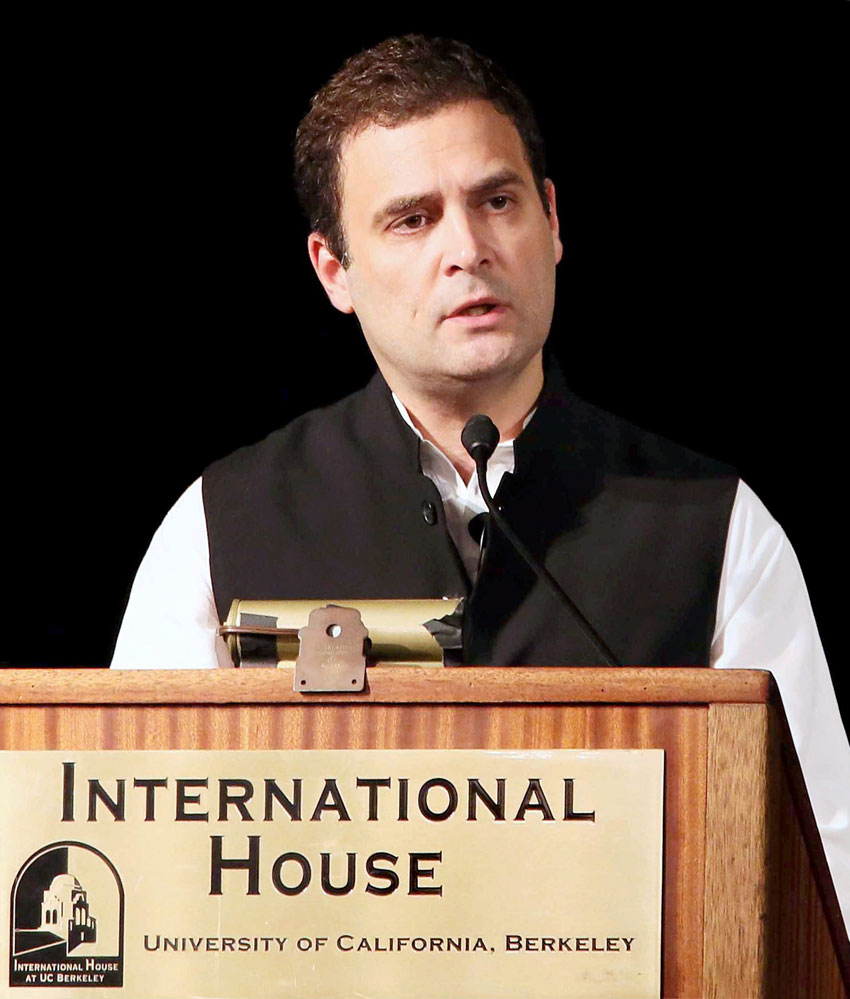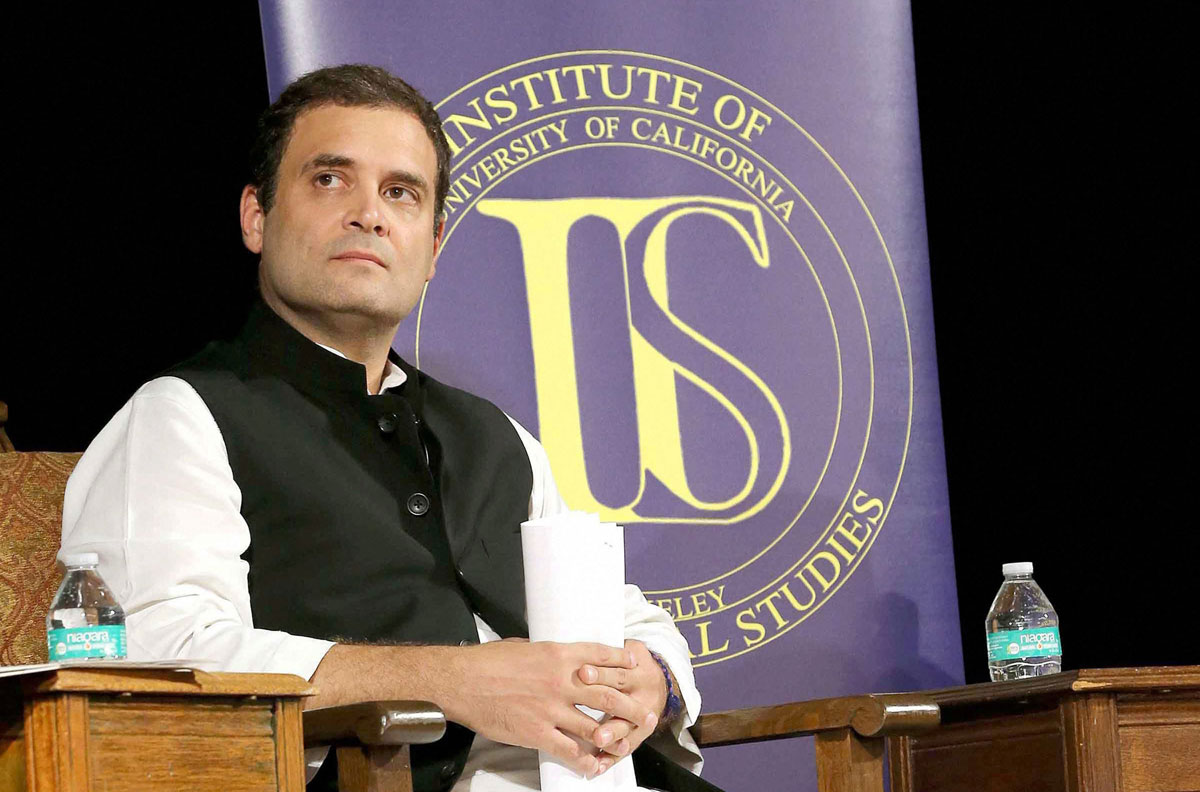Rahul Gandhi’s Talk at UC Berkeley: India Run by Dynasties; PM Modi’s Shortfalls
Congress Vice President Rahul Gandhi at Institute of International Studies at UC Berkeley, Sept. 11. (Press Trust of India)
Congress vice president Rahul Gandhi began his two-week visit to the U.S., Sept. 11, during which he will interact with global thinkers and political leaders, and address overseas Indians as part of an outreach initiative by his party, writes Lalit K. Jha.
In his first engagement, Gandhi would address students of the prestigious University of California, Berkeley on ‘India at 70: Reflections on the Path Forward’, in which he will offer his reflections on contemporary India and the path forward for the world’s largest democracy.
A day before the event, the University announced that the event venue has reached its maximum capacity and registration has been closed.
Gandhi, 47, was received at the San Francisco airport by senior Congress leader Sam Pitroda and Shudh Singh, the president of Indian National Overseas Congress, U.S.
“He is here at the University of California Berkley, where Pandit (Jawaharlal Nehru) addressed in 1949 as the Prime Minister. Today, we are at the cross roads where core value of Indian democracy secularism and pluralistic society is in danger,” Congress spokesman Madhu Goud Yaskhi said.
“He (Rahul Gandhi) strongly believes in these values for India to be a strong nation, and what is the way forward for India and his views and his thoughts about India s future,” the spokesman told PTI giving a preview of Gandhi’s speech.
During his trip to the U.S., he said, Gandhi will also engage with the Indian diaspora with the purpose of making them a part in India’s development.
From San Francisco, Gandhi is scheduled to travel to Los Angeles. He is likely to visit Aspen Institute to interact with the think-tank community.
In Washington, D.C., the Congress vice president is scheduled to interact with members of the think-tank community, political leaders and government officials.
Gandhi is also scheduled to travel to Princeton University before his final address to overseas Indians in New York.
India is Being Run by Dynasties. Brushing off suggestions that the Congress party is synonymous with dynastic politics, party vice president Rahul Gandhi said that dynasties are a fact of life in India, whether it be in politics or business, and insisted that the real test of a person is not pedigree but ability.
His comments in the U.S. set off a chorus of protest by the BJP in India with Union Minister Smriti Irani calling him a “failed dynast” and a failed politician.
Speaking at the University of California at Berkeley, Gandhi also hit out at Prime Minister Narendra Modi, accusing him of divisive politics, creating space for terrorism in Jammu and Kashmir and ruining the economy.
Responding to a question from students, Gandhi said that he was “absolutely ready” to take up an executive responsibility if the party asked him to do so.
Responding to another question whether the Congress party was more associated with dynastic politics, Gandhi argued that India is being run by dynasties.
“Most parties in India have that problem So… Mr. Akhilesh Yadav is a dynast. Mr. Stalin (son of M. Karunanidhi in DMK) is a dynast… even Abhishek Bachchan is a dynast. So that’s how India runs. So don’t get after me because that’s how India is run. By the way, last, I recall, Mr. Ambanis are running the business. That’s also going on in Infosys. So that’s what happens in India,” Gandhi said as he listed several prominent Indians born into famous families.
But, he said there were a large number of people in the Congress Party who were not from dynastic families.
“And I can name them in every state. There are also people who happen to have a father, or a grandmother or a great grandfather in politics. They do exist,” he said.
“The real question is whether the person actually a capable and a sensitive person,” the 47-year-old Gandhi said.
Gandhi said around 2012, the Congress Party “stopped having conversations with the people.”
He said this could be a problem for any party which is in power for 10 years.
“The vision that we laid out in 2004 was designed at best for a 10-year period. And it was pretty clear that the vision that we laid out in 2004 by the time we arrived in 2010-11 was not working anymore,” he said.
“Somewhere around 2012, and I say this, a certain arrogance crept into the Congress party. And they stopped having that conversation.”
When asked if he wanted to take up an executive role in the Congress Party, he responded by saying, “I am absolutely ready to do that.”
However, he left the decision on his party.
“We have an organizational election process that decides that. And that process is currently ongoing. So we have an internal system where we elect certain delegates who make that decision. So for me to say that that decision is mine that wouldn’t be very fair.
“That’s a decision that the Congress Party has to make and that’s a process that’s currently going on right now,” he said.
He also said the BJP is implementing most of the programs initiated during the Congress’ rule.
“The central architecture they borrowed from us. But that architecture does not work. Because we know it. It stopped working,” he said.
Gandhi said that Mahatma Gandhi’s idea of non-violence in India is under attack today.
“The idea of non-violence is what has allowed this huge mass of people to rise up together.”
He also criticized Prime Minister Narendra Modi’s foreign policy.

“Whereas I completely agree with their positioning as far as the (ties with) the U.S. are concerned, I think they’re making India vulnerable because, if you look at Nepal, the Chinese are there. If you look at Burma the Chinese are there.
If you look at Sri Lanka, the Chinese are there. If you look at Maldives, the Chinese are there,” he said.
“So on basic direction (of the foreign policy) I agree…
friendship with the United States, close bond with United States. But don’t isolate India, because it gets dangerous,” Gandhi said.
Modi Opened Up Space for Terrorists in Kashmir. Rahul Gandhi accused Prime Minister Narendra Modi of “massively opening up” space for terrorists in Jammu and Kashmir, leading to an increase in violence.
Addressing students at the University of California at Berkeley, Gandhi said the decision by Modi to have a political tie-up with the Peoples Democratic Party (PDP) was a “strategic mistake.”
“The PDP was the instrument that brought Kashmiri youngsters into the political process. And the day Mr. Narendra Modi made an alliance between the PDP and the BJP, it destroyed the PDP as an instrument that could bring youngsters into the political system.
“And the day he did that, he massively opened up space for terrorists in Kashmir and they came in. And you saw a massive increase in violence,” Gandhi said.
Gandhi said the intelligence personnel in Jammu and Kashmir told him that a large number of members of the PDP have suddenly gone towards the militants.
“When you take these strategic decisions to take a little bit of political advantage, you do tremendous damage to the country. Today the space in Jammu and Kashmir has been opened up, not only for the Pakistanis, but for other players in the region. And it is going to impose a massive, massive strategic cost on India,” said Gandhi.
Gandhi claimed that for nine years, he had worked behind the scene with the Prime Minister Manmohan Singh to improve the situation in Kashmir.
“The results were there for all to see as militancy was at an all-time low and tourism flourished in Kashmir,” he said.
After the 2014 elections, the PDP and the BJP tied up an alliance to form a government in the state.
Ready to take up executive role in Congress: Rahul Gandhi says he was “absolutely ready” to take up an executive responsibility if the party asked him to do so.
Gandhi said that around 2012 the Congress Party “stopped having conversations with people.”
He said this could be a problem for any party which is in power for 10 years.
“The vision that we laid out in 2004 was designed at best for a 10-year period. And it was pretty clear that the vision that we laid out in 2004 by the time we arrived in 2010-11 was not working anymore,” the 47-year-old leader said.
“Somewhere around 2012, and I say this, a certain arrogance crept into the Congress party. And they stopped having that conversation.”
When asked if he wanted to take up an executive role in the Congress Party, he responded by saying, “I am absolutely ready to do that”.
However, he quickly left the decision on his party.


